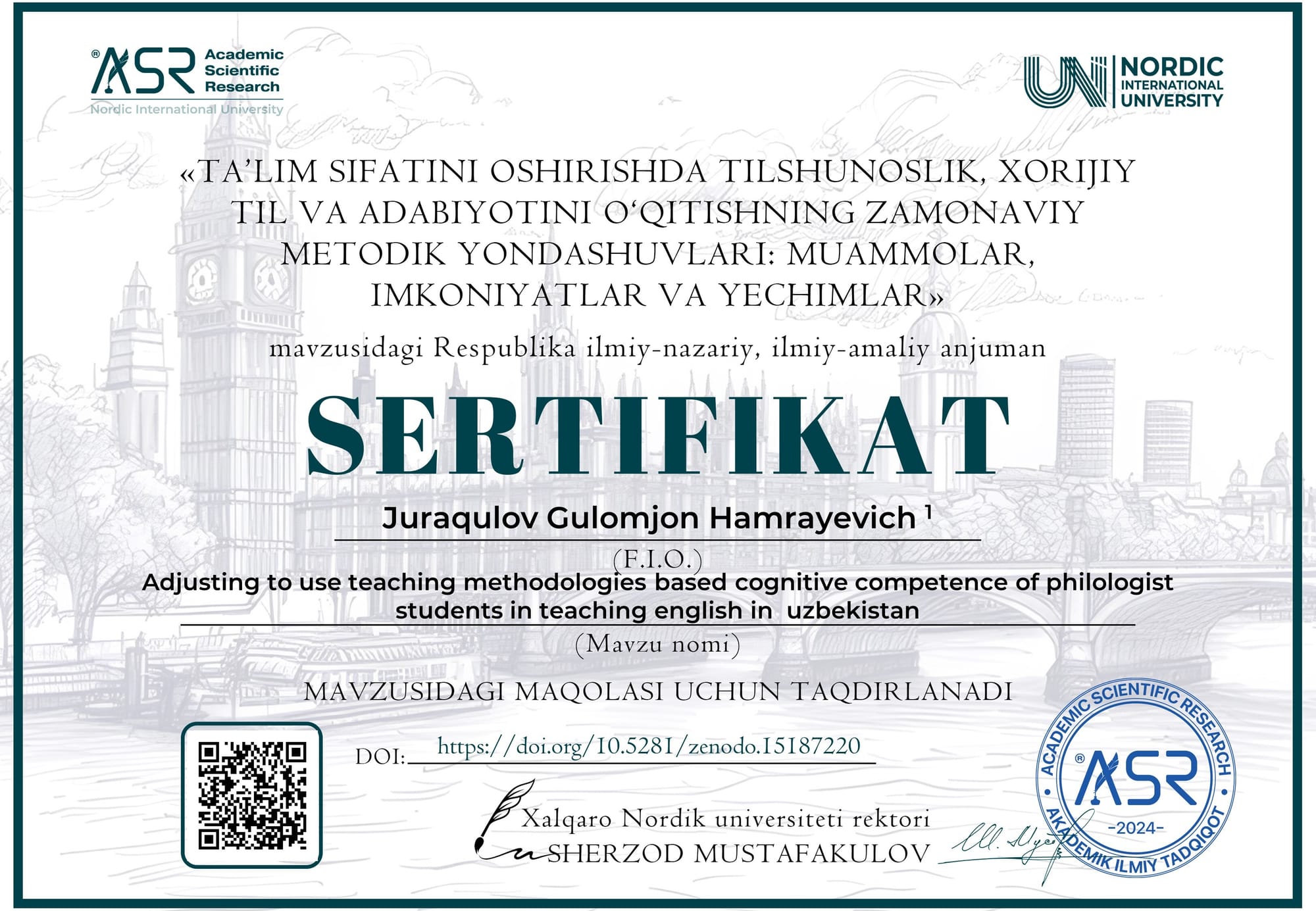Juraqulov Gulomjon Hamrayevich1

DOI: https://doi.org/10.5281/zenodo.15187220
Zenodo community: https://zenodo.org/records/15187220
Nordic_press journal: https://research.nordicuniversity.org/index.php/nordic/article/view/2293
MAQOLANI YUKLAB OLISH
SERTIFIKATNI YUKLAB OLISH
REVIEW:
The thesis explores a critical area in language education—enhancing cognitive competence in philological students, particularly in the context of English language instruction in Uzbekistan. By integrating cognitive learning styles—concrete, analytical, communicative, and authority-oriented—the study offers a comprehensive approach to improving the pedagogical techniques of future English language educators. The author bases his research on the learning style framework proposed by Malcolm Knowles in 1972, which focuses on the cognitive aspects of learning, contrasting it with more traditional models like the VARK model.
The thesis effectively establishes the relevance of these cognitive learning styles to the educational context in Uzbekistan, where the demand for high-quality language teaching is growing. The emphasis on cognitive learning strategies aligns with the evolving needs of English language instruction, where the development of critical thinking, adaptability, and linguistic proficiency is paramount.
Main Findings and Discussion:
Concrete Learning Style:
The author introduces the concrete learning style, which emphasizes hands-on, experiential learning. This style is particularly useful for beginners who benefit from tangible experiences such as role-playing, simulations, and multimedia tools. The thesis argues that concrete learners excel when provided with real-life scenarios and visual aids, making abstract concepts more accessible. While this approach is practical and engaging, the author notes the potential limitation of these learners struggling with abstract theories. Educators are advised to balance experiential learning with conceptual insights to enhance deeper understanding.
Analytical Learning Style:
The analytical style, which focuses on logical reasoning and structured problem-solving, is examined next. The thesis effectively links this style to Bloom’s Taxonomy, emphasizing the importance of critical thinking and deep cognitive engagement in language learning. Analytical learners thrive in environments where they can deconstruct linguistic structures and analyze grammatical rules. The author highlights that while this style promotes precision, it may also hinder spontaneous language use due to an overemphasis on accuracy. Thus, a balance between analytical rigor and practical language application is recommended.
Communicative Learning Style:
In line with Hymes’ (1972) theory of communicative competence, the communicative style prioritizes real-world interaction and practical language use. This approach encourages students to engage in group discussions, debates, and peer reviews. The thesis emphasizes the importance of fluency over accuracy for communicative learners, allowing them to express ideas effectively rather than focusing on perfect grammar. The communicative style fosters both cognitive and social dimensions of learning, making it essential for developing active language proficiency in real-world contexts.
Authority-Oriented Learning Style:
The authority-oriented style, which emphasizes teacher-centered instruction, is recognized as effective for providing structure and foundational knowledge, especially at the initial stages of learning. This style allows students to absorb core linguistic principles through explicit grammar instruction and vocabulary drills. However, the thesis also critiques the overreliance on this style, suggesting that it can limit creativity and independent thinking. A balanced approach, incorporating both structured and learner-centered methods, is necessary to promote well-rounded cognitive competence.
Summary and Recommendations:
The thesis provides a thorough analysis of how integrating cognitive learning styles into English language teaching can significantly enhance the cognitive competence of philological students in Uzbekistan. The author’s recommendations to adapt teaching methodologies based on learner preferences and contexts are valuable for educators seeking to optimize their pedagogical strategies. The study calls for a more nuanced approach compared to traditional models like VARK, urging a focus on the internal cognitive strategies that students employ to process and apply information.
In conclusion, the research is highly relevant to the current educational landscape in Uzbekistan, where the demand for well-trained English teachers is increasing. By embracing cognitive learning styles, educators can better address the diverse needs of learners, fostering both theoretical knowledge and practical application in language acquisition.
Overall Evaluation:
This thesis presents an insightful exploration of cognitive learning styles in the context of English language education. The author successfully integrates theoretical frameworks with practical recommendations, making it a valuable resource for educators and researchers alike. The balanced approach to various learning styles offers a comprehensive understanding of how teaching methodologies can be adapted to maximize student engagement and learning outcomes. This study is particularly timely and beneficial for the ongoing development of English language teaching practices in Uzbekistan.



